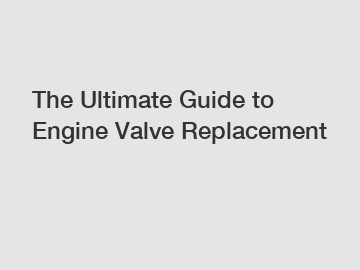The Ultimate Guide to Engine Valve Replacement
The Ultimate Guide to Engine Valve Replacement.
If you're experiencing issues with your vehicle's engine, it's possible that you may need to replace your engine valves. Engine valves play a crucial role in the combustion process, controlling the flow of air and fuel into the cylinders and directing exhaust gases out. Over time, these valves can wear out or become damaged, impacting the engine's performance and efficiency. In this ultimate guide to engine valve replacement, we will discuss the signs that indicate the need for replacement, the process of replacing engine valves, and the benefits of getting this essential maintenance procedure done.
Signs that Indicate the Need for Engine Valve Replacement.

1. Loss of engine power: If you notice a significant decrease in your vehicle's power, it might be an indication of worn-out valves. This decrease is usually caused by leaking or bent valves that prevent the engine from operating at its full potential.
2. Misfiring engine: A misfiring engine occurs when one or more engine cylinders fail to ignite properly. Faulty valves can lead to this problem, as they prevent the proper seal, resulting in incomplete combustion.
3. Increased fuel consumption: If your vehicle's fuel consumption has suddenly increased without any other noticeable changes, it could be a sign of damaged engine valves. Faulty valves disrupt the air-to-fuel ratio, causing the engine to burn more fuel than necessary.
The Process of Engine Valve Replacement.
1. Inspection: A professional mechanic will first inspect your engine valves to determine whether replacement is necessary and to identify any additional problems, such as worn-out valve guides or seats.
2. Removal: The old valves will be removed using specialized tools, which will allow the mechanic to access the valve springs, retainers, and seals.
3. Installation: New valves will be installed, ensuring that they are properly seated and aligned.
4. Valve seat grinding: If the valve seats have become worn or damaged, they will be ground down to ensure a proper seal. This step is crucial for optimal engine performance.
5. Valve guide replacement: If the guide or sleeve of the valve is worn or damaged, it will need to be replaced to prevent further issues.
Benefits of Engine Valve Replacement.
1. Improved engine performance: Replacing worn-out or damaged valves will restore the engine's performance, resulting in smoother, more efficient operation.
2. Increased fuel efficiency: Faulty valves often disrupt the air-to-fuel ratio, causing the engine to burn more fuel than necessary. By replacing the valves, you can improve your vehicle's fuel efficiency and save money at the pump.
3. Extended engine life: Engine valve replacement prevents further damage to the engine, ensuring its longevity and reducing the risk of more severe issues down the line.
In conclusion, engine valve replacement is a vital maintenance procedure that can significantly improve your vehicle's performance, fuel efficiency, and overall lifespan. If you notice any signs of engine valve problems or believe it's time for a replacement, it's crucial to consult a professional mechanic who specializes in engine repair. With their expertise, you can ensure that your engine is functioning optimally and avoid more costly repairs in the future. So, don't hesitate to contact us for all your engine valve replacement needs.
Contact us today for expert engine valve replacement services and let our experienced mechanics take care of your vehicle's engine to keep it running smoothly.
Are you interested in learning more about car engine valve price, custom engine valves, OEM: 06J 109 601 C? Contact us today to secure an expert consultation!


